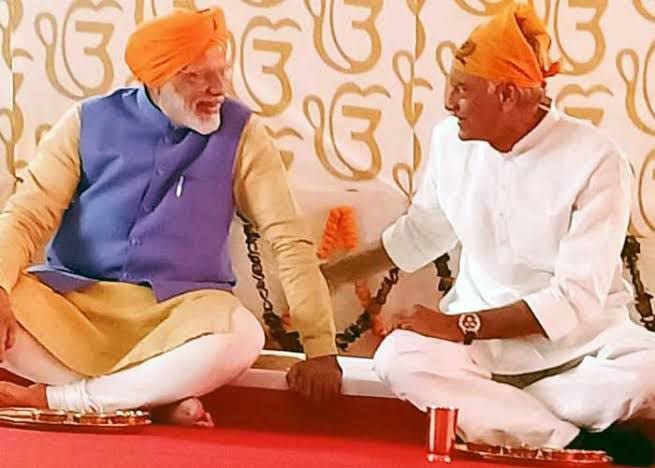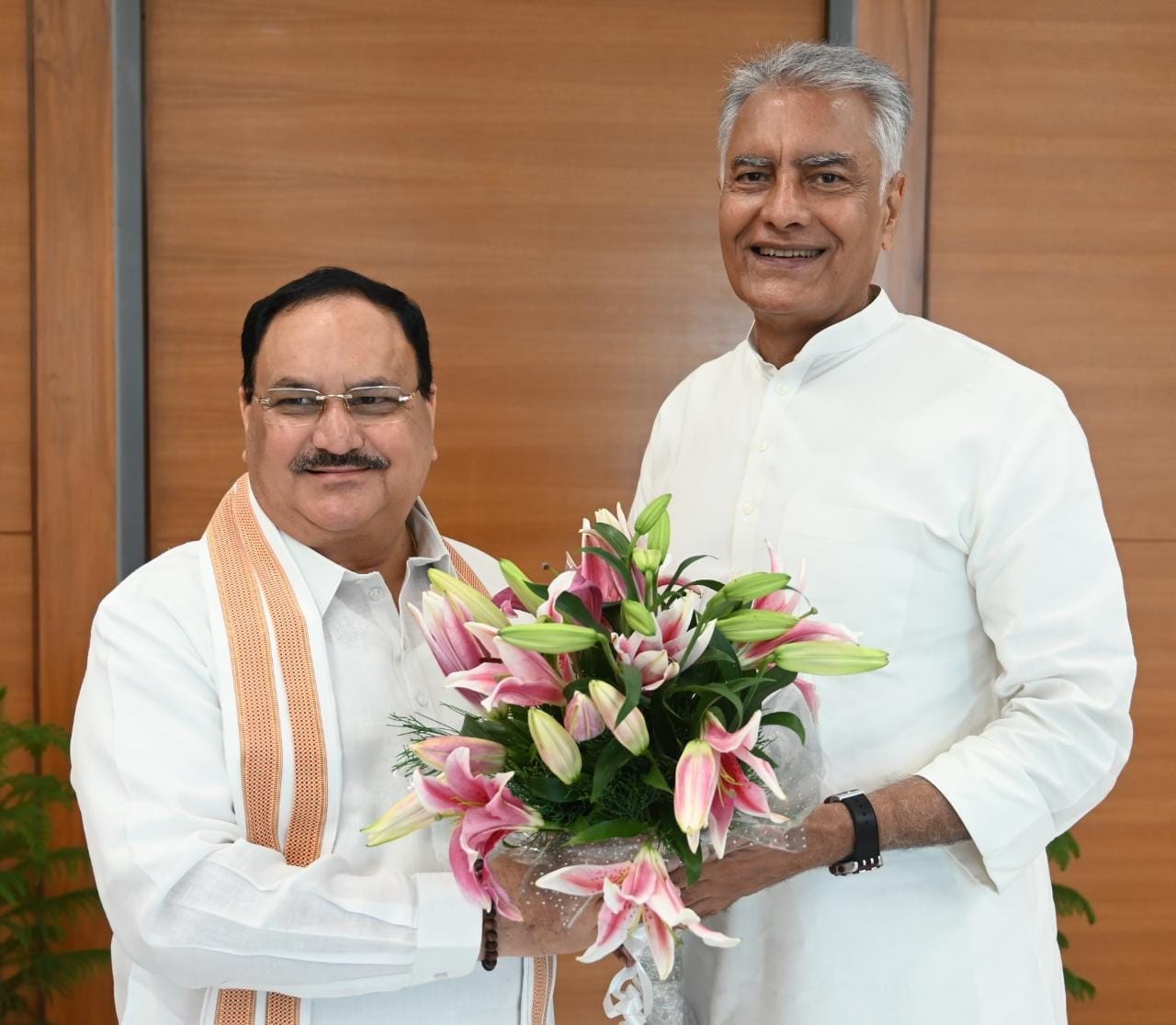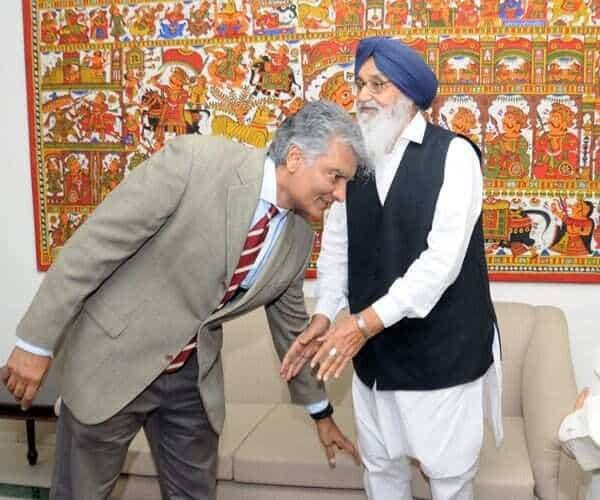Sunil Jakhar to 'The Tribune': "I have Resigned as Punjab BJP President, But Remain a Loyal Soldier"
Sunil Jakhar: A Political Veteran Reflects on Leadership and Responsibility
Sunil Jakhar: A Political Veteran Reflects on Leadership and Responsibility
Sunil Jakhar, the President of the Punjab BJP, has unequivocally announced his decision to step down from the party post, owning moral responsibility for the BJP’s dismal performance in the 2024 Lok Sabha elections, where the party failed to secure a single seat in Punjab. While his resignation has not been accepted, Jakhar describes his current status as being "on a sabbatical." In a candid reflection on his political journey, Jakhar touched upon his challenges within the BJP, as well as his "unsavory and unpalatable" experiences with the Congress Party, while also delving into the broader issues facing Punjab’s political landscape. With over five decades of public service under his belt, Jakhar has served as an MLA for three terms, a Lok Sabha MP, and as President of both the Congress and BJP in Punjab—roles that reflect his deep engagement with the state’s politics.
Departure from Congress and Critique of Divisive Politics
In an hour-long interview with Jyoti Malhotra, Editor-in-Chief of The Tribune, one of region’s most influential newspapers, Jakhar revisited his dramatic exit from the Congress in September 2021. He recounted his disillusionment with the Congress High Command after being overlooked for the Chief Ministerial post, despite enjoying overwhelming support from Congress MLAs. Allegedly, his Hindu identity was cited as the reason for his exclusion, leading Jakhar to accuse the party of embracing divisive identity politics. Now a committed BJP member, Jakhar remains a vocal critic of the Congress, accusing it of abandoning its secular ideals in favor of divisive policies like the caste census. However, Jakhar did not hold back in expressing disappointment with BJP’s inability to fully grasp Punjab’s unique ethos, including its failure to categorically affirm Sikhism’s distinct religious identity vis-a-vis Hinduism. Despite these frustrations, Jakhar remains steadfast in his commitment to the BJP, while emphasizing his enduring pride and identity as a Punjabi above all else.
Main Points from the Interview of Sunil Jakhar
Introduction:
The interview sheds light on the political journey of Sunil Jakhar, Punjab BJP President, his resignation (not yet accepted), and his broader commentary on Punjab’s political landscape. The former Congress leader, now with the BJP, delves into his disillusionment with both parties, recounting his five decades of public service and the challenges Punjab politics faces today.
Resignation and Current Status in BJP
Sunil Jakhar has submitted his resignation as Punjab BJP President, taking moral responsibility for the BJP’s failure to secure a single Lok Sabha seat in Punjab in 2024.
He insists that he remains a loyal BJP member but feels his role as State President should be handed over to someone else due to the party’s performance.
Despite stepping back from the leadership position, Jakhar maintains his commitment to BJP and rules out returning to Congress.
Disillusionment with Congress
Jakhar resigned from Congress in 2021, expressing disappointment at the party’s caste-based politics, particularly its refusal to appoint him, a Hindu, as Punjab’s Chief Minister despite his widespread MLA support.
He criticized Congress for abandoning its secular and inclusive values, citing the caste census as an example of its divisive agenda.
He talks disparagingly about the Punjab Congress leaders, while portraying Captain Amarinder Singh, the former CM and now with the BJP, as a titan among dwarfs.
Jakhar feels Rahul Gandhi is being misled and has lost control over party leadership, especially in Punjab.
Perspective on Punjab Politics and Governance
Jakhar highlighted Punjab's unique social fabric, emphasizing the deep-rooted secular and communal harmony which, according to him, Congress leaders have attempted to undermine.
He criticized the Congress leadership, accusing them of fostering identity politics in Punjab.
On BJP's performance, he noted that while the vote share has increased, the inability to secure seats reflects a lack of connection with Punjab's grassroots.
The Role of Shiromani Akali Dal and BJP’s “Bonsai” Experience
Sunil Jakhar emphasized the crucial role of the Shiromani Akali Dal (SAD) in Punjab’s political landscape, advocating for its rejuvenation—not necessarily under the leadership of Sukhbir Badal—as essential for a balanced and healthy democratic framework in the state. He described the SAD as a “safety valve” that historically contained radical elements and preserved Punjab’s socio-political harmony. Reflecting on BJP’s alliance with SAD, Jakhar admitted that while the coalition brought stability to Punjab during tumultuous times, it also stunted BJP’s growth by confining it to around 23 of the 117 Vidhan Sabha seats. This limited scope turned the BJP into a “bonsai” tree, unable to expand naturally across rural Punjab. He called for a reassessment of SAD’s role in Punjab’s politics, underscoring the need for its institutional presence to counterbalance rising radicalism and to ensure Punjab’s stability and progress.
Critique of AAP and Congress Alliance in Punjab
Jakhar accused the AAP and Congress of forming an unspoken alliance to protect their political interests, sidelining the needs and aspirations of Punjabis.
He pointed out a lack of credible opposition in Punjab, describing the current political scenario as anarchic.
Jakhar expressed concerns over rising corruption, gangsterism, and the governance model under Bhagwant Mann's leadership, who is “working under a super CM”, alluding to Arvind Kejriwal.
Perspective on BJP’s Strategy in Punjab
Jakhar criticized BJP’s past alliance with the Akali Dal, stating it stunted BJP’s growth in rural areas due to limited seat-sharing arrangements.
He expressed concerns about BJP’s current understanding of Punjab’s socio-political dynamics, urging the leadership to address local issues, including perceptions about religious identity and caste politics.
Jakhar acknowledged BJP’s lack of penetration in rural Punjab but stressed the need to win hearts through a genuine understanding of Punjabi issues.
On Farm Laws and Perceptions
Jakhar admitted the farm laws’ rollout created a communication gap, leading to mistrust among Punjab’s farmers. He believes dialogue and empathy could have mitigated this fallout.
He criticized primarily the state and central governments only peripherally for mishandling issues like procurement and policy implementation.
Vision for Punjab
Jakhar emphasized Punjab’s resilience and the need for any political strategy to prioritize the state’s unique ethos and communal harmony.
He appealed to all political parties, including BJP, to address fundamental issues of Punjab such as rural distress, farmer concerns, and social cohesion.
Concluding Note: A Crossroads for Sunil Jakhar and Punjab Politics
Sunil Jakhar’s interview highlights his nuanced and conflicted relationship with the BJP, reflecting both loyalty to the party and frustration with its strategies in Punjab. While Jakhar remains steadfast in his commitment to the BJP, his critiques of the party’s inability to fully grasp Punjab’s ethos, compounded by its central leadership’s top-down approach, suggest an ongoing internal struggle. He believes that those lacking roots in Punjab or a personal stake in its stability cannot adequately address its unique challenges. However, independent observers note that Jakhar himself has struggled to align with the BJP’s working style, particularly its synergy with the RSS, where the sangathan mantri (organization secretary) plays a parallel and influential role.
A Call for Long-Term Vision and Rejuvenation of SAD
With his self-declared “sabbatical,” it remains uncertain whether Jakhar will transition into a more prominent organisational role within the BJP, potentially at the national level, or seek a new political direction. He continues to stress the need for a long-term vision for Punjab’s prosperity, which he argues must include the rejuvenation of the Shiromani Akali Dal (SAD), irrespective of its leadership. Jakhar asserts that a revitalised SAD, with credible leadership, would be crucial in restoring balance to Punjab’s political landscape, serving as a responsible opposition party and a potential ally of the BJP. This, however, we believe, can only be achieved through free and fair SGPC elections—last held in 2011. Jakhar hopes the BJP high command will heed his advice and work actively toward fostering this alliance for Punjab’s stability and growth. However, whether these transformations, including the long-overdue SGPC elections, materialise anytime soon remains an open question—one that only time will answer.







BJP has no clue how to approach their politics and pursuit of power in Punjab. Their long association with corrupt SAD has left them with a lot of baggage to sort. Taking useless Jakhar made no sense at all, as he is not the one who can go to the ground and build party there. Punjab is in the hands of comrades and aristocrats/zamindars/middlemen and they won't let the political power go out of their hands so easily. BJP has no choice but to work at the bottom and grow organically instead of bringing leaders from Congress and asking them to lead. Ravnit Bittoo has shown some potential but it is too premature to see any future of BJP through him.
ਮੁੱਖ ਮੰਤਰੀ ਬਣਨ ਲਈ ਨੇਤਾਵਾਂ ਦੀ ਤਰਲੋ ਮੱਛੀ
ਇੱਕ ਅਨਾਰ ਤੇ ਸੌ ਬੀਮਾਰ